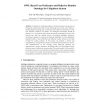3765 search results - page 74 / 753 » Formal Methods for Systems Engineering Behavior Models |
127
click to vote
ISORC
2000
IEEE
15 years 6 months ago
2000
IEEE
The Unified Modeling Language UML is well-suited for the design of real-time systems. In particular, the design of dynamic system behaviors is supported by interaction diagrams an...
125
click to vote
OTM
2005
Springer
15 years 7 months ago
2005
Springer
In ubiquitous computing, behavior routine learning is the process of mining the context-aware data to find interesting rules on the user’s behavior, while preference learning tri...
119
Voted
ENTCS
2008
15 years 2 months ago
2008
Engineering natural and appropriate interactive behaviour in ubiquitous computing systems presents new challenges to their developers. This paper explores formal models of interac...
113
Voted
ICFEM
2000
Springer
15 years 6 months ago
2000
Springer
Use Cases are a wide-spread informal method for specifying the requirements of a technical system in the early development phase. Z is a formal notation which aims to support, bes...
128
Voted
ICCD
2005
IEEE
15 years 11 months ago
2005
IEEE
Recent advances in Dynamic Power Management (DPM) techniques have resulted in designs that support a rich set of power management options, both at the hardware and software levels...

